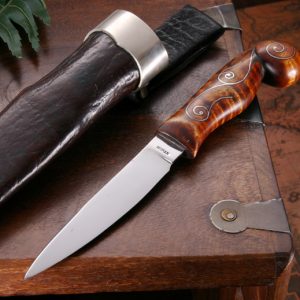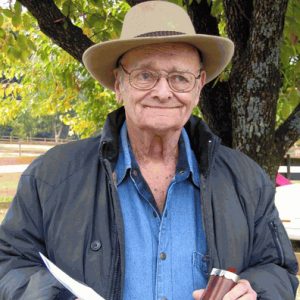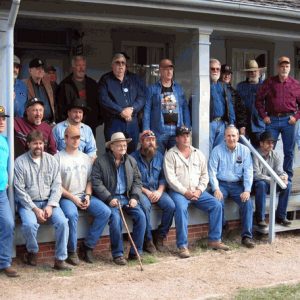calsfoundation@cals.org
Bill Moran Jr. (1925–2006)
aka: William F. Moran Jr.
William F. Moran Jr. was the father of both the American Bladesmith movement and the modern forging of Damascus steel. Moran rediscovered the ancient process of making Damascus steel (layered steel) and incorporated this steel into his knives. Named in his honor, the unique Bill Moran School of Bladesmithing was located on the grounds of Historic Washington State Park before relocating to Texarkana, Texas, in 2019. Moran’s legacy added to the historic fabric of Arkansas’s knife heritage and helped preserve the timeless art of knife making. Knives made by Moran are now some of the most valuable in modern handmade custom knives.
Bill Moran was born on May 1, 1925, to Margaret Reid Moran and William Francis Moran Sr., who was successful in the oil business in Pennsylvania. At the time of his birth, the family was living on a 150-acre dairy farm in Frederick, Maryland. Census records report a younger sister, born before 1930.
At an early age, Moran learned the basic skills of blacksmithing using an old coal forge on the family farm. He sold his first knife at age fourteen. He made most of his knives using a traditional coal forge in his rustic knife shop located in rural Frederick County, Maryland. He once said, “One reason I became a knife maker was because I could have all of the knives that I wanted.” Moran originally worked as a dairy farmer. In 1960, he sold his dairy farm and began making knives full time in a rustic coal-fired blacksmithing shop.
Moran married Margaret Creager on April 27, 1968; they had no children.
Rekindling the ancient skill of Damascus forging is one of the foremost of Moran’s legacies. Damascus steel is a combination of two steels forge-welded to create a unique pattern by a folding technique. After a Damascus blade is finished, it is treated with acid to reveal the grain pattern of the forging and layering process. Once a method for removing impurities for ancient sword and knife smiths, this technique allowed for stronger steel but is now largely used to enhance the beauty of a custom handmade knife. Moran once wrote about Damascus, “The patterns are as different and individual as the human fingerprint. Each one has character and soul of its own.” After years of trial and error, Moran made his first showing of modern Damascus steel in 1973. According to Moran, Damascus steel “brought back the forged blade” and “art knives.”
Moran made his knives to possess their own distinct look and feel. Common features of a Moran knife include wood-lined sheaths, a long slender bowie blade shape, and decorative silver wire inlay. Much ahead of his time, Moran made hand-forged blades with excellent balance and comfortable ergonomic handles. Moran usually crafted handles of wood, specifically native curly maple. His silver wire inlay reflects the embellishment of handmade Kentuckian, European, and American black powder rifles historically found in Maryland and Pennsylvania.
Moran utilized lots of carving and hand-decorative file work on his handles and guards. His technique of differential heat treating created more functional knives; hardening the edge of the blade while keeping the spine springy and flexible resulted in a durable, yet very sharp, knife. While most of Moran’s knives are fixed blades, he occasionally made the now-rare folding knife.
Moran founded and helped create the American Bladesmith Society (ABS) in 1976. A not-for-profit group dedicated to preserving the forged blade and educating the public about traditional knife making, the organization has grown to include knife makers and enthusiasts from around the world.
What is now the namesake Bill Moran School of Bladesmithing was founded in 1988 and resides on the grounds of Historic Washington State Park in Hempstead County, near where many historians believe the legendary local blacksmith, James Black, created the bowie knife sometime in the 1820s. The school was founded in a collaborative effort of the ABS, the Pioneer Washington Restoration Foundation, Arkansas State Parks, and Texarkana College. From 1988 to 2001, Moran taught at least one class a year at the school. He instructed in areas such as basic knife making and the forging of Damascus steel. Upon his retirement from teaching in 2001, the school was renamed in Moran’s honor. Hundreds of knife makers from around the world attend the first, and only, school dedicated to traditional bladesmithing and knife making. Moran once commented, “This school will be vital to the future of bladesmithing. It will make it unnecessary for each generation of smiths to reinvent the wheel.” Some of the most prestigious names in custom knife making have served as revolving faculty members of the Moran School.
Moran made knives for all types of people—outdoorsmen, collectors, soldiers, actors, statesmen, and even royalty. Currently, his knives appraise for tens of thousands of dollars and often command the highest prices in the custom knife market. Moran also created various other handmade items, such as dulcimers, archery bows, ironwork furniture, walking sticks, decorative boxes, and pipes.
Moran died of cancer on February 12, 2006, at Frederick Memorial Hospital. He is buried at Mount Olivet Cemetery in Frederick, Maryland.
For additional information:
Connelley, Larry. “Interview with Bill Moran.” http://www.knifeart.com/inwitbilmorb.html (accessed August 26, 2023).
Hughes, B. R., and C. Houston Price. Master of the Forge—William F. Moran, Jr. and His Classic Blades. Knoxville, TN: Perry & Price Publications, 1996.
Obituary of Bill Moran. The Washington Post. February 14, 2006, p. B06. Online at http://www.washingtonpost.com/wp-dyn/content/article/2006/02/14/AR2006021402058.html (accessed August 26, 2023).
Larry Connelley
KnifeArt.com Custom Knives







Comments
No comments on this entry yet.